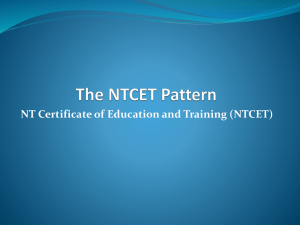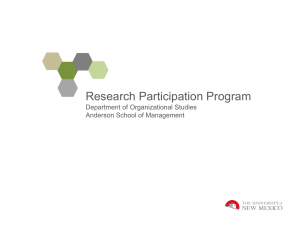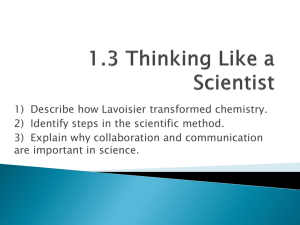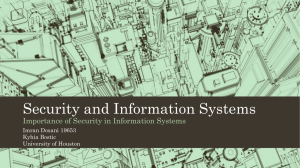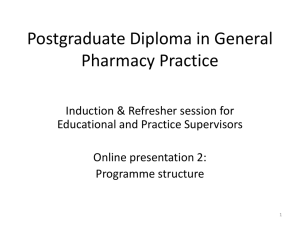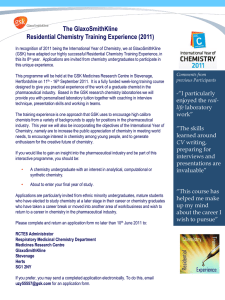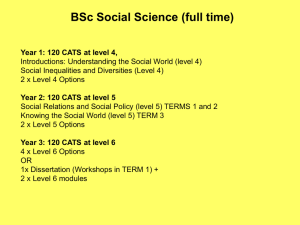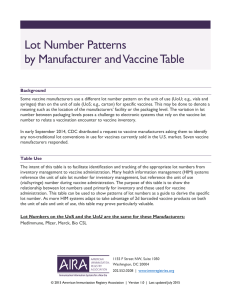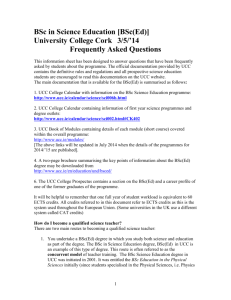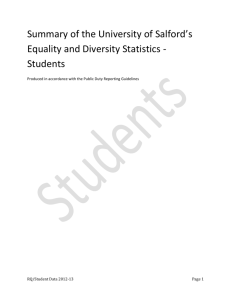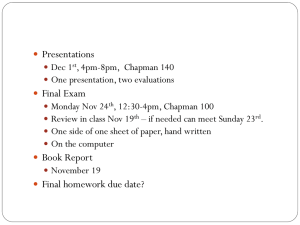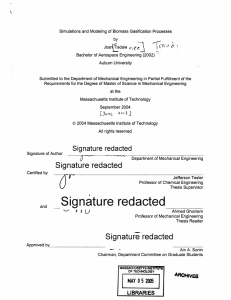Session 1a powerpoint presentation
advertisement
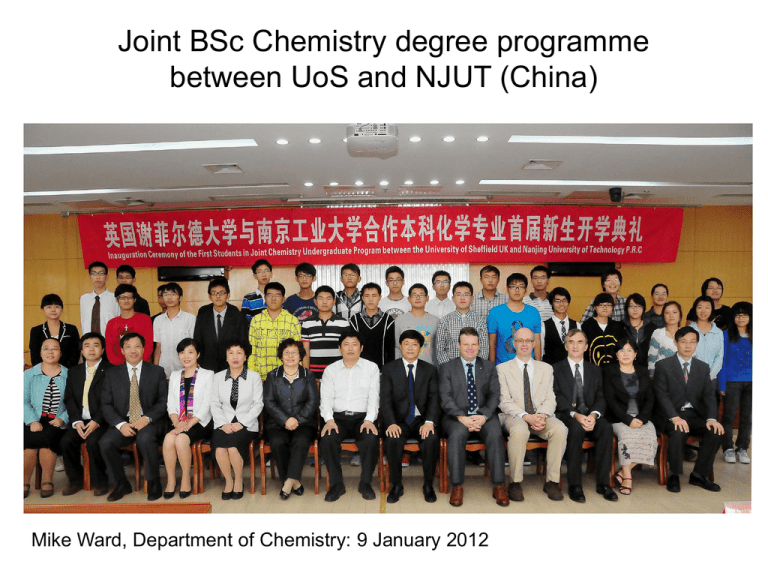
Joint BSc Chemistry degree programme between UoS and NJUT (China) Mike Ward, Department of Chemistry: 9 January 2012 New joint venture: BSc in Chemistry between UoS and Nanjing University of Technology First students recruited in China starting September 2011 How will it work? Tier 1 students recruited by NJUT (max. 60): these are good students (≈ top 10%) They study for 3 years at NJUT and come to Sheffield for their fourth year into our year 3: final year of BSc programme (first cohort, 2014) Not a conventional ‘3+1’ because we provide a significant amount of teaching to the students during years 1 – 3 in China so really (‘2.5 + 1.5’) Teaching we provide at NJUT • We provide one third of the total teaching hours during years 1 – 3 • This amounts to – our core L2 material (6 x 10 credits) – half of our core L1 material (2 x 10 credits) – a few lab practicals in each year in their teaching labs – a few level 1 lectures from our options by way of gentle introduction Why are we doing it this way given the effort involved? Ministry of Education in China likes this model and is promoting it – gets Chinese students used to being taught in English before they come to UK and promotes exchange between China / UK academic staff We provide 180 credits of material that can contribute to a BSc level degree: 60 credits from our L2 (at NJUT) plus 120 credits for the final year at UoS – means that students get a UoS BSc degree not a joint UoS/NJUT degree which would have major QC / QA accreditation problems Benefit to NJUT: recruitment of additional Tier 1 students paying enhanced fee – they benefit financially and reputation is enhanced by association with ‘world top 100’ institution Benefit to us: reasonable profit on our teaching at NJUT, plus substantial o/s fee income when up to students appear here each year in L3 (≈£800K p.a.?) Benefit to students: get a UoS degree and proficiency in English whilst only having to pay one year of the very high o/s fee rather than three years We estimate ≈ 9 visits p.a. by staff from Sheffield, each for a 2-week period to deliver the equivalent of 10 credits of our material form our L1 / L2 material E.g. 3 x 8-lecture segments from CHM1001/1002 = 10 credits to be delivered by Dr. Mark Winter in April next year – Molecules – d / f-block chemistry (1) – d / f-block chemistry (2) total of 24 UoS lectures plus 6 tutorials = 30 contact hours (at UoS) We are allocated 64 hours to teach this amount of material at NJUT: 6 ‘hours’ per day for 10 days (1 ‘hour’ = 45 minute session) Plenty of scope to deliver material slowly; repeat key points; go over tutorial material / additional worked Q&As / old exam questions; provide quizzes / whole class workshops…. whatever is useful All teaching and examining is in English Additional support that we can provide? – Videos of lectures (we have been advised that this is essential) – Detailed handouts containing all material in case they miss anything – Plenty of sample questions / worked answers available for practice All teaching material can be posted on MOLE2 or their equivalent (Moodle) for the students to download. Planned schedule of teaching visits: Meet new students, registration, intro to the course, ‘Explosives’ lectures MJW / MDW / BC, Oct Y1 10 credits of inorganic chemistry from CHM1001/2 MJW, April Y1 Introductory lab experiments ≈ 1 week plus ‘Supermarket Science’ lectures JH, April Y1 10 credits of organic chemistry from CHM1001/2 CAH, October Y2 10 credits of CHM2101 (Group theory / main group / Transition metal chemistry) MDW, end of Y2 (?) 10 credits of CHM2102 (3 x organic chemistry segments) ????, late in Y2 Remaining 4 x 10-credit modules from our year 2 (2 x physical, 1 x organic, 1 x inorganic chem) During NJUT Y3 Significant up-front effort in preparing material needed for staff who are giving 3 x 8-lecture courses (10 credits in total) in one visit • getting familiar with lecture courses that they do not normally give • possibly altering handouts / slides to ensure that everything is on paper (mindful of language issues) • videoing lectures ‘live’ where possible or making recordings separately … but this only needs doing once. Flights from Manchester to Nanjing (with 1 or 2 stops) – not too bad Staff accommodation provided by NJUT for duration of visits (furnished apartments, 70 m2, 2 bedrooms, living room, kitchen, bathroom) Visits can be arranged not to clash with teaching commitments here as far as possible Excellent, lively and interested group of students. From a recent email from Douglas Bond (US teacher who is doing some teaching at NJUT): “These students are much better than the ones that I have in the Applied Chemistry department. I "accidentally" made a mistake in a frequency/energy calculation and they called me on it. I told them that they had passed their first exam. The typical Chinese student will sit through class and not say boo, even if something is wrong. One of the things that I need to do is prepare them for western academic culture and they seem to making the transition. It is probably not all of them, but it isn't all in my US classrooms as well. By the end of class on Wednesday, they were beginning to ask about some of the English that I am using as well. Both days, there was a small group that stayed after class with a question and a lively discussion followed. This is a great group of students.” Logistical issues (which we are working out as we go) • we help with registration process when we go and meet new intake of students; registration essential as it gives them access to MOLE, UoS email etc. They do not have full access to our library from NJUT for copyright / licensing reasons. • we set and mark exams on the material that we teach; papers (‘real’ plus practice ones) sent to NJUT by email. Students allowed extra time / dictionaries. Scripts are photocopied and originals sent to us by courier for marking. • NJUT students get English language tuition at NJUT as part of the course. Must have IELTS 6 before they come to Sheffield for final year. Some already are better than that. • When they come they will arrive early (August) for one-month intensive course at ELTC plus orientation in university and department before term starts This would not have been possible without… Mark Winter and Beining Chen – academic colleagues from chemistry Tim Crick (International office) – initial negotiations Louise Loughlin (Registry services) Karen Anderson and Tom Rhodes (LETS) – regulations / contract … and our opposite numbers at NJUT
